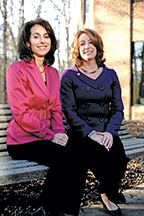STORY BY Judy Oppenheimer PORTRAIT BY André Chung
Stacie Hunt had lived and worked in Howard County for more than a decade. She had raised a family, worked for United Way, been involved in various volunteer programs and thought she knew pretty much everything there was to know about the community. Then, in 2002 she participated in a Leadership Howard County program and found out exactly how wrong she was.
“It was a real eye-opener,” she says of the Leadership Premiere program she went through. “I thought I knew a lot about how the community was structured, how all the pieces connected.” But during the 10-month program
 she learned about county issues, like aging, health care and education – and met people from every sector. Hunt discovered something else too – a fascinating new career, one that fit her better than anything had before.
she learned about county issues, like aging, health care and education – and met people from every sector. Hunt discovered something else too – a fascinating new career, one that fit her better than anything had before.
As it happened, Shirley Burrill, the first head of Leadership Howard County, announced her retirement that year. At first “I thought, oh, that’s interesting – that’s something I’d like to do when I grow up,” Stacie laughed.
Nevertheless, Hunt took the advice of a friend and applied for Burrill’s job, and – somewhat to her amazement – was hired. She has been president/CEO of the leadership organization ever since.
“It’s a never-ending cycle of learning,” says Hunt. “I learn something new every day.” Furthermore, she says, “I get to work with people who really care about the community.”
When Leadership Howard County was founded more than 25 years ago, its goal was simple: to create community leaders by educating men and women about the county they live in, encouraging them to develop and participate in various volunteer activities.
While today there are community leadership programs all over the world, there were only a few when Howard County launched its program in 1986.
“Some of the business leaders were being asked to get more involved with the nonprofit community and didn’t feel they knew enough about how it operated and what the issues were,” Hunt explains. “They wanted to develop a nice broad understanding,” so they started to look around for model programs. It turned out Baltimore City had a leadership program and that was modified to fit Howard County, she says.
The program currently offers three main programs: Leadership Premiere, for local leaders already active in the community; Leadership U, a youth program for high school juniors; and the five-year-old Leadership Essentials, a partnership with Loyola University aimed at young professionals. Students pay tuition, $795 for Leadership U, $2,800 for Leadership Essentials and $4,800 for the 10-month-long Premiere program, says Hunt.
Since it started, Leadership Premiere has graduated some 1,066 participants, but Hunt says its reach goes far beyond that. “There’s a trickle-down effect” when graduates talk to others, she says. “We feel we’ve had a significant impact. These people are now sitting on boards.” In fact, Leadership Howard County conducted a survey a couple of years ago and found that more than 240 organizations in the community had leadership graduates on their boards.
As the county has grown, the issues that demand attention from local leaders have changed as well. “One significant change since the early days is the aging of our population,” says Hunt. “For a long time we were such a young community. We now have the highest percentage growth of an aging population in the state. People are aging in place.” This means an increased need for aging services.
Another change has been in the diversity of the population. Columbia’s founders envisioned a diverse community where everyone was accepted; still, even they probably never imagined it would become a place where 80 different languages are spoken.
At the same time, other issues remain evergreen; transportation is one. “It’s ongoing, there’s no easy fix. We don’t have anything but bus service. It requires public-private partnerships.”
In an era where many bemoan partisanship in the country at large, Leadership Howard County is apolitical. “We really emphasize that politics stay out of it,” says Hunt. “It doesn’t matter if you’re liberal, conservative or Green party. Our purpose is to make the community the best it can be. And it works.” Those who go through the programs inevitably get involved in various community projects, come up with their own and end up true community participants. Nearly all of them stay in Howard County and continue to be involved. Some rise to prominence. Jim Robey, for example, was a police officer when he entered the Leadership Premiere program back in 1987. He then became head of the police department and is now Assistant Deputy Majority Leader of the Maryland State Senate.
Leadership U, the program for high school students was started in 1995. “We’re a steppingstone for students,” says Hunt. Most participants come from public and private schools throughout the county, with some home-schooled students – the only requirement is that students live in Howard County. Each session takes up to 50 students, evenly divided between boys and girls. “We look for a wide range of students,” says Diane Freedman, who directs the program. Those who are accepted, she says, are “interested in community service and learning about the county.”
Nearly all participants go on to college, says Freedman. “We give them skills and the knowledge they can make a difference.”
The program spans the first semester of the junior year, beginning with an intensive weeklong introduction just before the start of the school year. This immersion includes team-building activities at Terrapin Adventures, as well as tours of such county facilities as the hospital, senior center, detention center, police station and courthouse. “We throw them into the heart of it,” Freedman explains. “We don’t want them to be bored.”
Each group breaks up into several smaller groups to work on various community projects the students come up with themselves.
Marnie Rosenbaum, who participated in the first Leadership U program 16 years ago, says she valued the opportunity to meet students from other schools in the county, “people I never would have been friends with. It was a chance to make a whole new group of friends.”
Rosenbaum, who teaches physical education and health, along with coaching field hockey and softball at River Hill High School, says she still uses some of the team-building activities she learned at Leadership U.
Megan Florenzo, who completed Leadership U nine years ago, recalls learning the importance of meeting deadlines. “It’s easy when you’re in high school, to say I’ll do this and then it doesn’t get done,” she says. “It’s different when people are depending on you.”
Florenzo, a financial consultant who is now advising a Leadership U group, says her experience as a high schooler in the program “opened my eyes to the idea that people can make a difference, no matter how small.” Her group is involved in putting together care packages for kids who are in and out of treatment at Howard County hospital.
Last year, Andrea Breeden, now a senior at McDonogh school in Owings Mills, participated in a Leadership U group that created an after school program aimed at combating childhood obesity. The group visited an after school center each week to play games and talk about fitness, she says.
Breeden says she appreciated getting to know other students. “The first day, I didn’t know a single person,” she recalls. “But we did this icebreaker thing, where we unrolled a ball of string as we talked about ourselves.” The group also experienced zip lining and put together a mini Olympics competition. “We had partners where one is blindfolded and balls are scattered about. The other person would describe where they were – you had to be very clear.”
Breeden, who speaks German and Spanish, hopes to pursue a career in international relations – but she knows she’ll also be volunteering in the future as well. A goal, she says, is to work with schools about nutrition awareness.
Leadership U, says Diane Freeman, offers opportunities ranging from many about the county, others more personal, some tailor-made to help students with college interviews. “We have something we call elevator speech. What if you were in an elevator and had only 30 seconds to get your point across?” But most important, she feels, is the fact that they’re thrown into different groups, with kids they never knew before. “That way, they’re not pigeonholed into what they need to be at school – and their true selves are able to come out.”
Staci Hunt says all Leadership Howard County participants leave the program with a new perspective. “They understand the bigger picture, how things are interconnected and what they can do to make a difference,” she says. Her predecessor held the job for 17 years. When she took the job, Hunt says, “Someone told me, we expect 17 years from you too.” Ten years in, she says, “that doesn’t seem such a far-fetched possibility.” *




